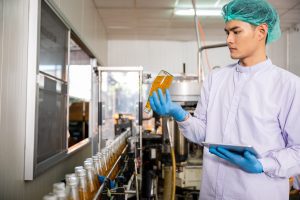The PCQI in ‘PCQI Certificate’, stands for Preventive Control Qualified Individual. The Preventive Control Qualified (PCQI) credential fits within the US FDA’s Preventive Controls for Human Food regulations (21 CFR Part 117), a rule mandated by the Food Safety Modernization Act (FSMA). Known as “PCQI individuals”, these food safety professionals oversee the safe manufacturing/processing, packing and holding of food products for human consumption in the United States. They design food safety plans, review food manufacturing records, validate food process parameters and values as well as perform plan re-analyses.
What is the work of a PCQI?
PCQIs work for US and foreign food companies that must register with the US FDA under the Public Health Security and Bioterrorism Preparedness and Response Act (2002) or “Bioterrorism Act”. PCQI individuals need not be employed by the site. Some compliance activities need PCQI professionals to review documentation every week. This can make it hard for food consultants and other third-party service providers to offer regular food compliance services.
How do I train to become a PCQI?
The Food Safety Preventive Control Alliance (FSPCA) offers PCQI training through approved training providers. FSPCA is a “broad-based public-private alliance of industry, academia, and government stakeholders. It was established in late 2011 by a grant from the U.S. Food and Drug Administration (FDA) to Illinois Tech’s Institute for Food Safety and Health (IIT IFSH).”
Lead instructors must register all PCQI courses with FSPCA and abide by the FSPCA training policies. In this regard, it’s important to note that the PCQI training course is not a PCQI certification.
PCQIs obtain a certificate that denotes that they attended PCQI training and successfully engaged with the materials. Taking the course and participating in the workshop qualifies participants to obtain a PCQI certificate, not a PCQI certification or designation.
In addition, a PCQI certificate doesn’t immediately qualify a food safety professional to work in industry. Industry experience is critical to master the full job description of the PCQI.
At Sirocco Food + Wine Consulting, we have trained the PCQI curriculum since its inception in 2016. The issuance of FDA guidance documents and stakeholder feedback prompted the release of version 2.0 which will be available in the coming months.
PCQI’s shared responsibilities under the PC rule
 The following paragraph is an excerpt from the PC rule (21 CFR Part 117). The rule outlines specific shared activities that a team of PCQIs and qualified auditors may undertake to fulfill the requirements of the regulations under FSMA.
The following paragraph is an excerpt from the PC rule (21 CFR Part 117). The rule outlines specific shared activities that a team of PCQIs and qualified auditors may undertake to fulfill the requirements of the regulations under FSMA.
117.180 Requirements applicable to a preventive controls qualified individual and a qualified auditor.
(a) One or more preventive controls qualified individuals must do or oversee the following:
(1) Preparation of the food safety plan (§ 117.126(a)(2));
(2) Validation of the preventive controls (§ 117.160(b)(1));
(3) Written justification for validation to be performed in a timeframe that exceeds the first 90 calendar days of production of the applicable food;
(4) Determination that validation is not required (§ 117.160(c)(5));
(5) Review of records (§ 117.165(a)(4));
(6) Written justification for review of records of monitoring and corrective actions within a timeframe that exceeds 7 working days;
(7) Reanalysis of the food safety plan (§ 117.170(d)); and
(8) Determination that reanalysis can be completed, and additional preventive controls validated, as appropriate to the nature of the preventive control and its role in the facility’s food safety system, in a timeframe that exceeds the first 90 calendar days of production of the applicable food.
(b) A qualified auditor must conduct an onsite audit (§ 117.435(a)).
In addition, qualified auditors must have the technical skills needed to perform FSMA consultative or regulatory audits. Auditors and PCQIs must keep records of their training.
What is the difference between HACCP and SQF and how does PCQI fit into HACCP and SQF?
HACCP is an internationally recognized food safety management system. HACCP principles are at the core of all food safety regulations and manufacturing standards. The SQF code requires that a HACCP plan be maintained to obtain SQF certification. For more information refer to our past blog on the subject.
How much does it cost to get PCQI certified?
PCQI training prices vary based on training providers. FSPCA maintains a list of approved public courses.
PCQI certificate training comes in different formats and duration: live and in-person, online and remote, self-paced and recorded. The full-length course is 2.5 days or 20 hours.
The hybrid format includes a self-paced section followed by a one-day (8 hours) session with a live instructor (in person or online). Private courses may also be booked and approved by FSPCA. For more information on our courses, please see the reference section at the end of this blog.
What is the equivalent of HACCP certification?
 HACCP certification is a training credential offered by the International HACCP Alliance through qualified lead instructors. A list of approved instructors can be found on their website.
HACCP certification is a training credential offered by the International HACCP Alliance through qualified lead instructors. A list of approved instructors can be found on their website.
The 2-day accredited HACCP course is based on CODEX and NACMCF guidelines. It is an international food safety training credential.
This credential is recognised by organisations such as SQFI to approve SQF practitioners. Indeed, the SQF code for manufacturing requires that management designate one lead and one backup SQF practitioner with formal HACCP training to oversee the design and implementation of a Codex HACCP plan.
The FSPCA course teaches participants the skills to interpret correctly FDA’s preventive control rule for human food requirements which apply to certain foods consumed in the United States. An FDA Preventive Control plan is based on Codex HACCP guidelines but is more encompassing than HACCP systems.
Did PCQI replace HACCP?
The PCQI credential is not replacing HACCP training. Following consultation with industry, the FSPCA is updating the PCQI curriculum to include a HACCP chapter. Version 2.0 of the PCQI curriculum will be released soon after lead instructors are trained on the revisions.
This should allow PCQI individuals to submit their certificates and qualify to work in compliance environments that require knowledge of HACCP. SQFI has announced that they will accept any training certificate with a Codex HACCP component in the future.
What is the difference between HACCP and GMP certification?
When attending HACCP or PCQI complete training, course participants are introduced to Good Manufacturing Practices or GMP. While CCP and Preventive Controls focus on the process, broader food safety controls apply to manufacturing facilities. The GMP refer to more general food safety controls that support critical activities under a site’s food safety plan.
The PCQI and HACCP certificates do not expire but we recommend that you refresh your training every five years.
Why is the PCQI Certificate important?
PCQI and HACCP certification training are essential to work in the food industry as well as to understand the food safety requirements of food import and food export regulations.
Is PCQI worth it?
Obtaining a PCQI certificate provides insights and hands-on training on developing food safety plans that are compliant with the Preventive Control rule under FSMA. PCQIs must have knowledge of potential food safety hazards in food processes. They must be able to conduct a risk analysis to determine significant hazards that require preventive controls for safety.
They must be familiar with process, allergen, supply chain and sanitation controls and understand how to implement the management components of the PC rule. Finally, PCQI professionals must be aware of prescriptive requirements of the PC rule (scope of the hazard analysis and risk, frequency for record verification, process validation and plan re-analysis).
References
1. PC Human Food | Preventive Controls Qualified Individual | Fspca
2. Sirocco Consulting (PCQI training courses – 2.5 days and 1 day (hybrid course)
3. Sirocco PCQI hybrid course Part 2 (online, live instructor)
4. FSPCA Manual (Version V1.2 Public)
Sirocco Food + Wine Consulting provides training and consulting services to food importers and manufacturers seeking FDA and SFCR compliance as well as HACCP and SQF certification. Our group of experts write Codex HACCP plans for SQF, Canadian PCP plans for import, manufacturing and export as well as FDA Preventive Control plans and FSVP plans. We serve our clients in English, French, Spanish and Chinese. Subscribe to our newsletter to unlock discounts and learn more about food safety management.





